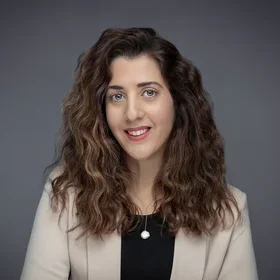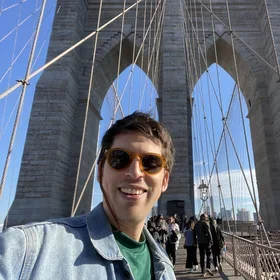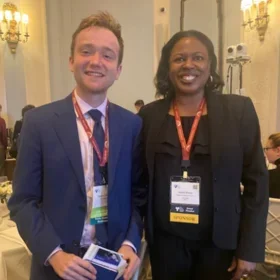Roberto Beltrán Sáez, a native of Chile’s Araucanía region, developed a deep appreciation for nature early in life. Now, as one of the first two Luksic Scholars in Columbia University’s School of Professional Studies’ (SPS) M.S. in Sustainability Management (SUMA) program, Beltrán Sáez is excited to bring back the skills and insights needed to drive meaningful change in Chile’s public sector.
“When I learned about Columbia’s SUMA program, I knew it was the next step for me,” says Beltrán Sáez. “The curriculum’s emphasis on practical, real-world applications of sustainability drew me in immediately.”
In an interview with SPS, Beltrán Sáez discussed what ultimately attracted him to the SUMA program, what his experience has been so far, and his plans for the future.
Can you share how your upbringing in the Araucanía region of Chile influenced your passion for environmental sustainability?
My childhood experience in southern Chile, particularly in the Araucanía region, really shaped my passion for environmental sustainability. This area has a unique geographical context with rainy winters and a rich variety of wildlife. Growing up in this environment instilled in me a deep appreciation for nature and a commitment to protecting it.
How has your background in acoustic engineering shaped your approach to protecting natural resources?
Acoustic engineering includes subspecialties like environmental noise and vibrations, which are closely linked to sustainability. Studying at Universidad Austral de Chile in Valdivia also influenced my approach. Valdivia faced a major environmental issue with its river, which prompted a national investigation and highlighted the need for balance between industry and wildlife. This experience reinforced my belief in the importance of protecting natural resources.
How has your experience in the SUMA program been so far, and what are you most excited about as you continue your journey in the program?
The classes are fascinating, and engaging with people from all over the world has led to enriching discussions and collaborations. Beyond academics, there are countless events hosted by the university and various organizations, offering valuable networking opportunities. I recently joined the Columbia Aquanauts, a student group dedicated to addressing global water challenges, which has been a fantastic opportunity to gain knowledge and broaden my perspective on water-related issues.
As part of the first cohort of Luksic Scholars in the SUMA program, how do you feel this opportunity is helping you prepare for your future work in Chile’s public sector?
Being part of the SUMA program is invaluable, not only for the formal knowledge but also for the chance to experience how people here think and work. My classmates and professors bring diverse perspectives that I believe will give me a unique approach to solving problems and will add value to my future work in the public sector in Chile.
I’m particularly interested in addressing climate change, especially considering the increasing frequency of natural disasters linked to this phenomenon. I would love to work in a multidisciplinary group focused on studying climate change effects in Chile and their relationship with environmental assessment.
How do you plan to apply the tools and insights you’ve gained in the SUMA program to address environmental challenges in Chile?
The SUMA program provides me with updated tools to analyze and tackle environmental issues, particularly related to climate change. Additionally, the networks I’m building will help me approach problems from an interdisciplinary perspective, enhancing my capacity to find effective solutions.
What is the most fun or interesting thing you’ve done in NYC so far? What do you want to do in the city before you go back to Chile?
One of my favorite new NYC experiences was attending a Yankees vs. Red Sox game at Yankee Stadium. The energy was incredible, with loud cheers and chants filling the air. I loved the family-friendly atmosphere and all the exciting action on the field.
Also, though it’s not NYC-specific, one of the most memorable experiences has been singing in Columbia University’s Collegium Musicum with Ramin Arjomand. It’s been wonderful to balance intellectual growth with artistic expression. Before I leave, I’d love to attend a concert by the New York Philharmonic—an experience I’m really looking forward to!
About the Program
The Columbia University M.S. in Sustainability Management program offered by the School of Professional Studies in partnership with the Climate School provides students cutting-edge policy and management tools they can use to help public and private organizations and governments address environmental impacts and risks, pollution control, and remediation to achieve sustainability. The program is customized for working professionals and is offered as both a full- and part-time course of study.
About the Luksic Scholarship for Sustainability at Columbia University
In its inaugural year, the Luksic Scholarship for Sustainability at Columbia University, supported by the Luksic Foundation, covers the full cost of attendance, including tuition and living expenses for students in the Master of Science in Sustainability Management (SUMA) program. Students who have lived or worked in Chile and who are committed to working on sustainability efforts in the region will be eligible for the scholarship.
Application for fall 2025 enrollment is open. The deadline for international applicants is March 15, 2025. Further information regarding application requirements can be found here.


